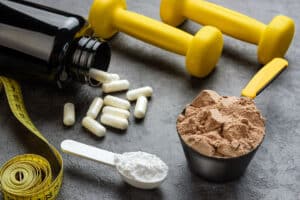Calcium makes brittle bones!
Are you thinking “How can that be? I was told to drink three glasses of milk to get the calcium I need for strong bones…how did I end up with osteoporosis?”
You are not alone; an estimated 10 million Americans – 8 million women and 2 million men – have osteoporosis. Another 34 million have osteopenia (low bone mass), which increases their risk for osteoporosis, and most of them “got milk.”
Let’s try to get to the truth about osteoporosis.
Is it true that I should take a minimum of 1200mg of calcium a day? FALSE
Is it true that milk is the best source of calcium? FALSE
If you don’t drink milk are you going to get osteoporosis? FALSE
There is not much correct information floating around about the management of osteoporosis. Here are the facts.
Your body is constantly building bone and at the same time it is tearing down bone. It is a constant renewal process to ensure strong, healthy bone structure. Before the age of thirty, you are building more bone than you are breaking down. However, after approximately age thirty you will begin to break down more bone than you are building.
HEALTH HINT: Build the strongest and most dense bone before the age of thirty.
Osteoporosis management does not begin after you fracture your hip. It begins when you are still riding the bright yellow bus going to school. It starts in adolescence and it continues throughout adulthood.
Let’s talk about what you can do to build strong, dense and healthy bone, and then we can break down the hidden evils that reduce the density of our bones.
Bone Building
Calcium: Yes, you need calcium but that is not the entire story. Making strong bones with simply calcium would be like trying to make a cake and merely having one egg. Yes, there are eggs in cake, but if that is all you have then good luck trying to make a cake!
A Harvard study showed that women who consumed a third of the recommended calcium per day did not have any higher risk of osteoporosis. People in countries such as India, Japan, and Peru consume as low as 300mg a day of calcium, and the risk of bone fractures is quite low.
The National Dairy Council has instilled paranoia in people about their calcium levels in order to sell more milk. They use fear as a sales tool, but in doing so they did not tell the public the complete story. Dairy does have calcium but it also has both phosphorus and protein. These two substances cause your body to lose the calcium that is found in the milk. The phosphorus in the milk must be excreted but in order to get it out of the body, it takes the calcium with it!
The forms of calcium that will provide the best rates of absorption are: calcium ascorbate, calcium pantothenate, calcium citrate, calcium succinate, caclium tartrate, calcium malate and calcium fumurate.
Magnesium: Without magnesium, calcium will make hard but very brittle bones more prone to fracture. Calcium without magnesium is a formula for trouble. Look at your calcium supplement…did they forget the magnesium? That calcium can make brittle bones is a very strong statement but it was made by Mildred Seeling, MD, the foremost international authority on magnesium. Unfortunately, magnesium is one of the most rampant nutritional deficiencies in humans. There are an estimated 40% of people deficient in magnesium in the United States.
Vitamin D: This vitamin is essential in building strong bones due to its ability to increase the absorption of calcium in your digestive system and decrease the excretion of calcium in the urine. The active from of Vitamin D that your body can use is called 1,25 dihydroxycholecalciferol. It is a long name but an important one. Most bone formulations you buy in the store have inactive forms of Vitamin D, and if you are lucky your body will convert the inactive Vitamin D into the active vitamin in the liver and kidneys. Check your vitamin to make sure that the underlined form of Vitamin D is in your vitamin. If the numbers are not in front of the name, you are ingesting inactive forms of Vitamin D.
Vitamin K, Boron, Zinc, Copper and Silica are also very important for bone health.
Exercise: Weight resistive exercise or any simply “weight bearing” exercises will stress the bone and promote more bone deposition. Swimming, although great for the heart, does not play as much of a significant role when dealing with osteoporosis.
The Bone Robbers:
Caffeine: Consumption of caffeine (especially four cups of coffee a day) will cause excess calcium to be excreted in your kidneys, thereby increasing the risk of fracture.
Sugar: The consumption of sugar increases calcium excretion by 25% more than caffeine! It is not the need for more calcium that you should worry about; it is less caffeinate and sugar. If your body is secreting calcium more quickly than you have been consuming it, you will be at a constant deficit. Pediatric osteoporosis is a new concept of ruining your bones as a child, which makes severe osteoporosis as an adult inevitable.
pH: Your body regulates its blood pH to an exact level (7.4). This level needs to be kept almost constant; even minor variations are dangerous. If the blood lowers to pH 6.95 (barely over the line of the acid side), a coma and death result. Therefore, your body will do anything to balance the acids in your body.
When you drink soda with a pH of 2.5, your body goes into shock and begins to pull calcium out of your bones to balance the acids in your blood. Again, you don’t need more calcium; you just need to stop eating acidic foods and drinks that cause you to excrete calcium. The rules are simple. Your ability to follow them is the variable in question.
HEALTH HINT: Bone Matrix is a formulation guaranteed to ensure adequate bone formation and maintenance. Click Here for more information.



